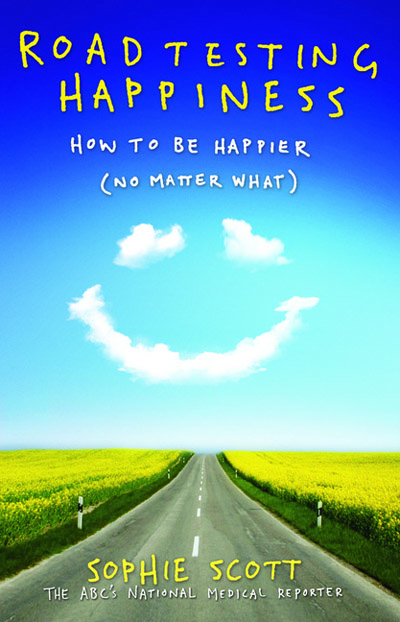Reviewed by Cherese Sonkkila
Roadtesting happiness: How to be happier (no matter what)
By Sophie Scott
In an incredible crash-course in wellbeing, Sophie Scott investigates and trials six different happiness techniques supported by science.
Covering a lot of ground, Roadtesting Happiness roams from psychology-based methods such as mindfulness and cognitive behaviour therapy to simply sleeping and eating right. Along the way there are loads of quotes, questionnaires, resources, and other tidbits to help guide the readers’ journey.
These features, along with the easy-to-read language, make this book an excellent introduction to the science of happiness. However, science or psychology aficionados might find themselves wishing for a little more detail and jargon as they read through.
Even so, the book is filled with some really surprising and delightful facts. Research shows that volunteering and helping others is a great way to boost your happiness levels, whereas an increase in salary doesn’t necessarily mean an increase in joy. This all ties into a theme that resonates throughout the book: that real happiness is not about instant gratification, but is characterised by a deep sense of fulfilment.
This sense of meaning is precisely what Scott had set out to find in her own life. She reveals that her reasons for writing the book were deeply personal. As an ABC medical reporter specialising in cancer, her world was turned upside down when her mother passed away from the very disease she was confronted with day-to-day. In a bold move, Scott switched to writing about happiness instead. Throughout her book, she documents her battle with grief and how she responded to different happiness methods recommended by experts today.
In addition to Scott’s own reflections there are numerous anecdotes by regular people on how they achieve happiness in their lives. Although these passages often seem tangential to the more evidence-based text, they give insight into the incredible variety in how people enjoy life.
The way in which we each find happiness is a personal and unique journey. In fact, research shows that we are most happy when we’re playing our strengths. When people are doing what they’re good at they can experience flow; this is the feeling of being completely absorbed in an activity that brings joy and satisfaction. Experts say that finding out which activities put you in a state of flow, and sticking with them is the key to a happy life. The finding out is the tricky part; it requires some effort.
Unfortunately, effort seems to be the name of the game if you want to be happier. Scott’s wide-ranging research on happiness reveals that living a happy life starts with deciding to be happy. Even little changes can make a difference to your wellbeing; noticing a negative thought pattern or even putting a sticker in your diary to mark achievements can all help to reinforce new habits. But the more you put into your happiness regime, the more you will get out of it!
This is a good book for anybody who likes a bit of science and is looking for some evidence-based tips on how to live a life they love.
—
 Cherese is a science writer based in sunny Melbourne. She has been published in COSMOS, KnowHow, The Postgraduate Survival guide, Ri Aus Teachers’ Notes and more. She holds a Bachelor of Science majoring in Ecology and Evolutionary Biology as well as Psychology. Although she is passionate about most things sciencey, Cherese has soft spots for environmental psychology, sustainability and conservation. In her spare time you can find her cycling, recycling and reading.
Cherese is a science writer based in sunny Melbourne. She has been published in COSMOS, KnowHow, The Postgraduate Survival guide, Ri Aus Teachers’ Notes and more. She holds a Bachelor of Science majoring in Ecology and Evolutionary Biology as well as Psychology. Although she is passionate about most things sciencey, Cherese has soft spots for environmental psychology, sustainability and conservation. In her spare time you can find her cycling, recycling and reading.
Cherese’s LinkedIn: au.linkedin.com/in/cheresesonkkila
Cherese’s Twitter: https://twitter.com/c_kkila

Reblogged this on My Blog News.